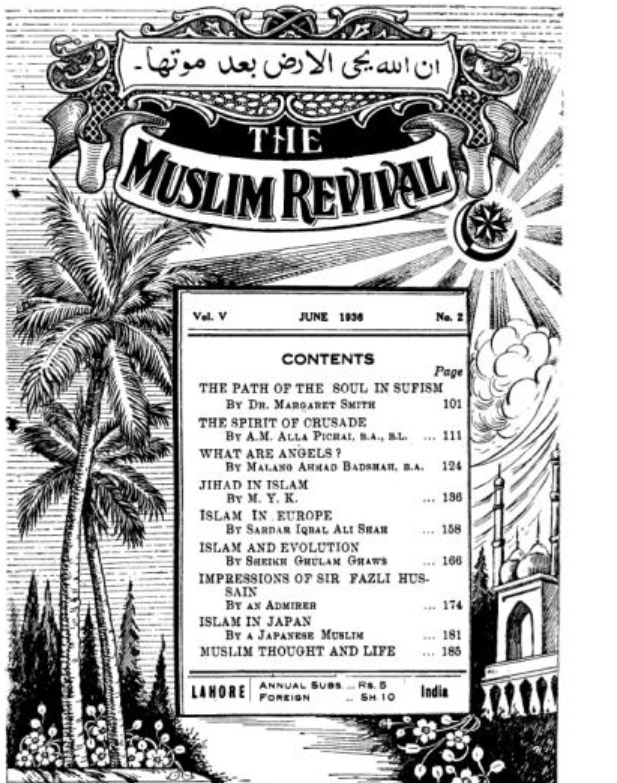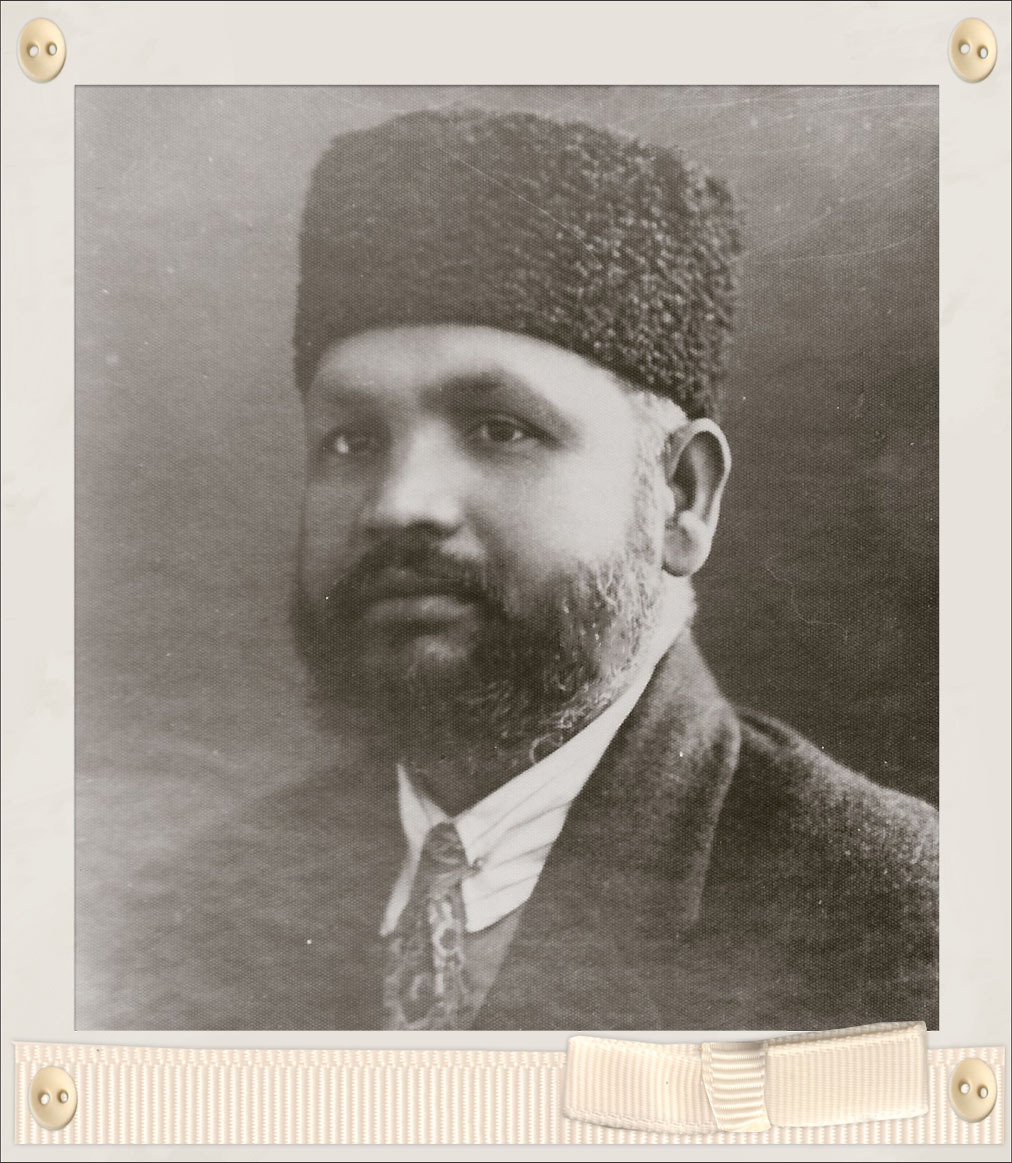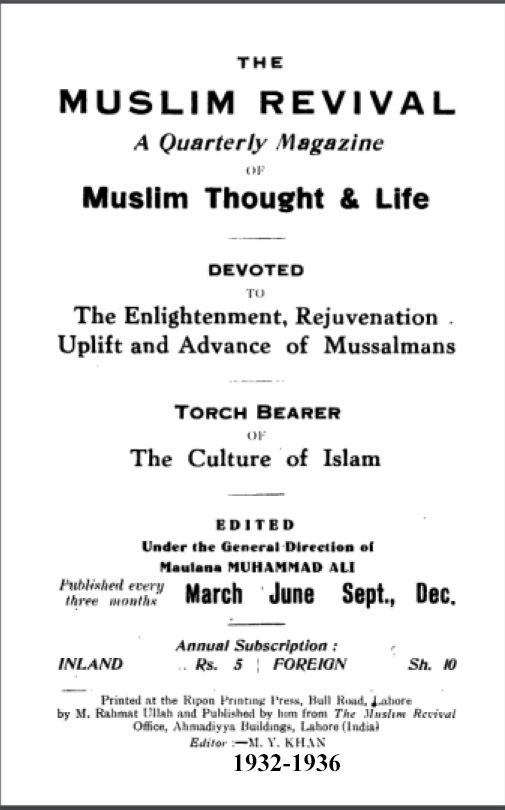JIHAD IN ISLAM – Part 1
 The Islamic institution of Jihad is greatly misunderstood by Muslims as well as non-Muslims. The Encyclopaedia Britannica (14th edition) defines it as “the religious duty inculcated in the Quran on the followers of Muhammad to wage war upon those who do not accept the doctrines of Islam.” (Art. Jihad). Under the article “Islamic Institutions,” the same book has the following on Jihad.
The Islamic institution of Jihad is greatly misunderstood by Muslims as well as non-Muslims. The Encyclopaedia Britannica (14th edition) defines it as “the religious duty inculcated in the Quran on the followers of Muhammad to wage war upon those who do not accept the doctrines of Islam.” (Art. Jihad). Under the article “Islamic Institutions,” the same book has the following on Jihad.
“Unbelievers must be invited to embrace Islam and, if they follow a sacred book and are not idol-worshippers, are given a choice between (a) becoming Muslims or (b) submitting to the Muslims and entering on a treaty with them of protection and tribute; or (c) fighting. If they accept Islam, their lives, families and property are secure, and they form henceforth part of the Muslim community. If they submit and enter treaty relations, they pay a poll tax, for which their personal safety is assured, and assume a definitely inferior status, having no technical citizenship in the state, only the condition of protected clients (dhimmis.) If they elect to fight, the door of repentance is open, even when the armies are face to face. But after defeat, their lives are forfeit, their families are liable to slavery, and all their goods are seized. Apostates must be put to death.”
The Encyclopaedia of Islam, under the article on Jihad, expresses the same view – “the spread of Islam by arms is a religious duty imposed upon Muslims in general. Further on, the view is expressed:
“In the Meccan Suras of the Qur’an, patience under attack is taught; no other attitude was possible. But at Medina, the right to repel attack appeared, and gradually, it became a prescribed duty to fight against and subdue the hostile Meccans. Whether Muhammad himself recognized that this position implied steady and unprovoked war against the unbelieving world until it was subdued to Islam may be in doubt.
Traditions are explicit on the point, but the Quranic passages speak always of the unbelievers who are to be subdued as dangerous or faithless.”
In another book, Beacon Lights of History, we read: —
“The chief fault we have to find in Muhammad was the propagation of his doctrines by the sword, the use of wicked means to bring about a good end.”
Klein, in his The Religion of Islam, defines Jihad as:
“Jihad – the fighting against unbelievers with the object of either winning them over to Islam or subduing and exterminating them in case they refuse to become Muslims, and causing Islam to spread and triumph over all religions is considered a sacred duty of the Muslim nation.”
COERCION OF CONSCIENCE AGAINST THE QURAN
One has only to put this view of Jihad side by side with the Quranic verses proclaiming perfect freedom in the matter of conscience to realize its absurdity. The following are a few verses on the point: —
“And say: The truth is from your Lord, so let him then who will, believe; and let him who please disbelieve.” (18: 29)
“Say: O people! indeed, there has come to you the truth from your Lord; therefore, whoever goes aright, he goes aright only for the good of his own soul, and whoever goes astray, he goes only to the detriment of it, and I am not a custodian over you.” (10:108)
“Let there be no compulsion in religion. Now is the right way made distinct from error; therefore, whoever disbelieves in the devil and believes in Allah, he indeed has laid hold on a strong handle which shall not break off, and Allah is Hearing Knowing.” (2: 256)
COERCION AGAINST THE PROPHET’S PRACTICE
The Prophet’s practical life is undoubtedly the most authoritative commentary on the teachings of the Quran and when we turn to this,
we find a faithful translation of the above teachings in practice. The following historical incidents should throw enough light on the point.
In pre-Islamic Arabia, if a father were childless, he would take a vow that if a child were born to him, it would be brought up as a Jew. According to this practice, the Aus and Khazraj, the two tribes of Medina, had many such children put in charge of the Jewish tribe of Banu Nazeer. When this tribe was exiled from Medina, the above two tribes, which had since joined Islam, wanted to take back their children from them to be converted to Islam. It was on this occasion, according to Abu Dawood, that the verse “There is no compulsion in religion” was revealed. The Jews were allowed to take these boys of Muslim parents along with them.
Durri Mansur describes this incident in the following Hadith:
“Some from among the Ansar were brought up by the Banu Quraiza so they had adopted their religion. When Islam came, they sought to force them to accept Islam. So was revealed the verse – ”There is no compulsion in religion.”
According to Durri Mansur, Umar had a Christian slave, Asbaq, by name. The Caliph would often persuade him to accept Islam, but he always refused. The Caliph would thereupon console himself with the Quranic verse – “There is no compulsion in religion.”
There is quite a heap of evidence to show that compulsion was never resorted to in the matter of conversion. According to the same collection, Durri Mansur, the Caliph Umar, told an old Christian woman to accept Islam, and she would be saved. On her refusal, he said, “God, be Thou witness that I have presented Islam to her,” and then he recited the verse, ” There is no compulsion in religion.”
IBN-KASEER AND ZAMAKSHARI
Ibn-i-Kaseer and Zamakhshari are two well-known authorities on the exposition of the Quran. Commenting on the verse 2:256 لَآ إِكۡرَاهَ فِي ٱلدِّينِۖ, the first says: “Compel not any to accept Islam for it is so manifest and its arguments are so obvious that it stands in no need of compelling anyone to join.”
The other says:
“God does not allow compulsion in the matter of religion. He has left it to the choice of man himself.”
QURANIC VERSES AGAINST COMPULSION
Quranic verses may be multiplied to show that compulsion in the choice of faith is considered absolutely out of the question:
“And if your Lord had pleased, surely all those who are on earth would have professed faith. Will you then force men to become believers?”
“Perhaps you (Muhammad) will wear yourself away with grief because they will not believe. Were it Our will we could send down to them a sign from the heaven, before which they would humbly bow” (26: 3, 4).
“We know best what they say, and you are not to compel them. Warn them by the Quran those who fear My threat” (20:45).
“Warn them then; for you are a warner only; you have no authority over them” (88:21, 22).
“Surely you cannot guide whom you love, but Allah guides whom He pleases, and He knows best the followers of the right way” (28: 56).
“And if your Lord had so willed, He would certainly have made people one nation, but they shall continue to differ. Except those on whom your Lord has mercy and for this did He create them” (9:118, 119).
“But if they dispute with you, then say: I have submitted myself entirely to Allah, and so has every one of my followers and say to those who have been given the Book and the unlearned people: Do you submit yourselves. If they submit, they follow the right way, and if they turn back, then upon you is only the delivery of the message, and Allah sees His servants” (2:19).
THE TRUCE OF HUDAIBIYA
In the sixth year of the Hijrah, the Prophet ﷺ, along with 1400 companions, went on a pilgrimage to Mecca. The Meccans offered opposition with the result that an agreement was made between the parties declaring the cessation of hostilities for a period of ten years. One of the terms of this Truce was that if a Meccan went over to the Muslims, the latter would refuse him asylum and return him to the Meccans. There were cases of converts who were actually turned out of Medina, the capital of Islam, under this term of the treaty. Rather than force others to embrace Islam, this looked like forcing people not to accept Islam. When told to go back, one such convert raised this objection. “Do you mean to force me back into unbelief?” he said.
THE FALL OF MECCA
As a result of the violation of the Truce of Hudaibiya, war was renewed, and the Prophet ﷺ, at the head of 10000 strong, made a bloodless triumphal march into Mecca, the citadel of all opposition against him. What did he do to the people? Did he convert them to Islam? Nothing of the kind. He granted unconditional amnesty to one and all. Acceptance of Islam was not made a condition of such amnesty. The treatment accorded to the fallen foe is thus depicted by Muir from the mouth of one of them:
“Blessing be on the men of Medina; they made us ride while they themselves walked; they gave us wheaten bread to eat when there was little of it, contenting themselves with dates.” As a matter of fact, it was this humanity of Islam which won the hearts of erstwhile enemies and brought them within Islam.”
CHARTER OF FREEDOM OF FAITH
Compulsion in the matter of conscience is so repugnant to Islam that it is not content with mere prohibition to force faith on others; it actually takes measures to ensure their enjoyment of the free exercise of their faith without any molestation. One such measure was the drawing up of solemn charters in the name of the Prophet, guaranteeing the free exercise of religion to Jews, Christians, and Zoroastrians.
CHARTER TO THE JEWS
The Charter granted to the Jews of Medina is thus recorded in Ibn-i-Hisham:
“This is the pledge of the safety which Mohammad ﷺ, the Prophet of God, gives to the Muslims whether they be from the tribe of Quraish or Medina and to all people irrespective of the tribe to which they belong or the religion which they profess, who have promised to remain on peaceful terms with him and his followers. The state of war or peace will apply to all Muslims, and no Muslim will be permitted to fight or make peace with the enemies of Islam on his own responsibility. Jews who live under our protection will be guarded against all sorts of persecutions and indignities, and they will be equally entitled to our shelter, help and good treatment along with the Muslims. The Jews belonging to the tribes of Bani Auf, Bani Najjar, Bani Haris, Bani Jassam, Bani Ghalib, Bani Aus and all other inhabitants of Medina will form, in conjunction with the Muslims, one community, and they will exercise the rights and perform the rites of their religion as freely as would the Muslims. Those who have entered into a treaty of friendship with them and are under their protection will enjoy the same rights as are accorded to the Jews. The Jews will help the Muslims in defending Medina. All those who would accept this alliance will be protected and guarded. The friends of the Jews will be accorded the same honourable treatment as is accorded to themselves. All true Muslims will have nothing to do with anyone who would be guilty of any sin, tyranny, dissension or rebellion, and no one will help a culprit; however nearly he may be related to him. All the differences and disputes of those who accept this pledge of safety will be referred to and decided by the Prophet of God.”
CHARTER TO CHRISTIANS
According to Futuh-ul-Buldan Balazari, the charter of freedom of faith granted to the Christians of Najran and later on extended to the Christian Subjects of Islam all over the world runs as follows:
“This is the document which Muhammad, son of Abdullah, God’s Prophet, Warner and Bearer of glad tidings, has caused to be written so that there should remain no excuse for those coming after. I have caused this document to be written for the Christians of the East and the West, for those who live near, and for those of the distant lands, for the Christians living at present and for those who will come after, for those Christians who are known to us and for those as well whom we do not know. Any Muslim violating and abusing what is therein ordered would be regarded as a violator of God’s testament and would be the breaker of his promise and would make himself deserving of God’s curse, be he a king or a subject”.
“I promise that any monk or wayfarer, etc., who will seek my help on the mountains, in forests, deserts or habitations, in places of worship, I will repel his enemies with all my friends and helpers, with all my relatives and with all those who profess to follow me and will defend him, because they are on my covenant. And I will defend the covenanted against the persecution, inequity and embarrassment by their enemies in lieu of the poll tax (Jizya) they have promised to pay”.
“If they will prefer themselves to defend their properties and persons, they will be allowed to do so and will not be put to any inconvenience on that account. No bishop will be expelled from his bishopric, no monk from his monastery, and no priest from his place of worship, and no pilgrim will be detained during his pilgrimage. None of their churches and other places of worship will be desolated, destroyed, or demolished. No material of their churches will be used for building mosques or houses for the Muslims. Any Muslim so doing should be regarded as recalcitrant to God and His Prophet. Monks and bishops will be subjected to no tax (jizya) or indemnity, whether in forests or rivers or in the East or West, North or South. I give them my word of honour. They are on my promise and covenant and will enjoy perfect immunity from all sorts of inconveniences. For those who retire to the mountains and dedicated places, the produce of their cultivated lands will not be subjected to tax or tithe and in times of scarcity of food, they will not be compelled to contribute anything in the form of grain. No military service will be taken from them, nor will they be required to pay jizya. No more than 12 dirhams per annum will be taken from their merchants, landholders and the wealthy. None should be harassed and tyrannised for the payment of taxes. Religious controversies and disputations should be talked to with civility and lenience. Let mercy overwhelm them wherever they may be; they should be protected from all troubles and injuries. He who broke God’s covenant and adopted a defiant attitude will be regarded as His enemy and the violator of His testament. Every help shall be given to them in the repair of their churches. They shall be absolved from wearing arms. They shall be protected by the Muslims. Let this document be not disobeyed till the Judgment Day”.
CHARTER TO THE ZOROASTRIANS
The following is the text of the Charter to Zoroastrians as recorded in Futul-ul-Buldan Balazari:
“In the name of God, the Merciful and the Compassionate. This is a letter from Muhammad, Allah’s Apostle to Farrakh bin Shakhsan, brother of Salman and for his family and his progeny whether they become Muslim or stick to their religion. This letter is a pledge of protection from me to Farrukh bin Shakhsan and his posterity for the safety of their persons wherever they live, whether in the plains or on the mountains. They will be entitled to the unrestricted use of the wells and meadows in their possession. They will not be maltreated and tyrannised. It is incumbent upon those also before whom this letter of mine is read that they protect Farrukh bin Shakhsan and his descendants, allow them full freedom and liberty of action and check others from harming them, and should not evince malice against them by subjecting them to maltreatment and indignities. I overlook their custom of shaving and wearing Zunnars and forgive them the payment of all taxes and the allied restrictions and inconvenience. They will enjoy, as usual, the full and unrestricted mastery over their sacred places and the lands and jagirs connected with them. They shall not be deterred from wearing good and ostentatious dresses, from riding on horses, making buildings and stables and from carrying the corpses of their dead or from doing anything which their religion permits them. They shall be entitled to better treatment than all other non-Muslims. Let no one disobey and dispute this testament which I leave behind me, giving the co-religionists of Salman (Salman was a Zoroastrian before he accepted Islam at the hands of the Holy Prophet) and the future generations of the Zoroastrians the free and unrestricted exercise of their religion and the protection of the Muslims, whether they accept Islam or remain Zoroastrians. He who will obey my command, God’s mercy will descend on him. He who will disobey me on him shall fall the curse of God till the end of the world. He who will be kind to them will do me good, and such a person will be rewarded by God. He who will harass them will harass me. I will be his enemy till the Last Day. The fire of hell will be his recompense, and I will not intercede for him with God.”
The Muslim Revival – June 1936
M. Y. K.
(Continued)



